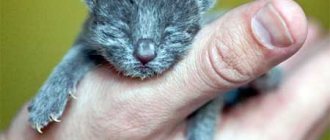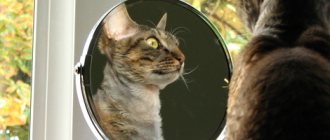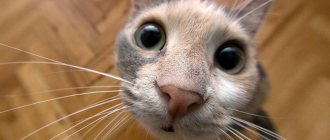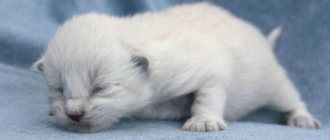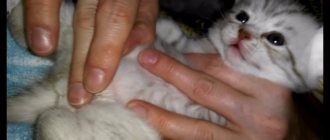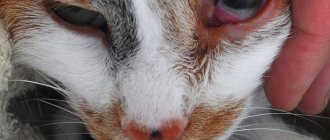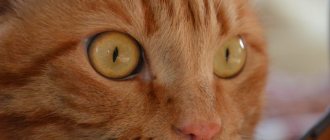Why are people born blind?
It is worth noting that the “unfortunate” cubs of the cat family share this fate with another faithful companion of man - newborn puppies. Both spend some time after birth with their eyelids completely glued together. How can this feature be explained?
Kittens with closed eyes
There have been no scientific studies on this issue. But caring owners of furry and squeaking creatures, through simple observation, deduced three main reasons:
- Kittens are born two weeks premature. This physiological feature was formed during the time of their wild ancestors. The female had to quickly recover in order to continue hunting, obtaining food, which is almost impossible to do with a huge belly at the ready.
- Closed eyes act as a defense mechanism. A newborn kitten has a very weak immune system and is unable to cope with hostile viruses and bacteria in the environment. When the body becomes stronger, the eyes begin to open.
- Performing a protective role, but already in the womb. It is believed that the liquid in which the embryo resides is not clean or sterile. Therefore, nature, by “covering” the kittens’ eyes and ears, made sure that no pollution entered the developing body.
What to feed a newborn kitten?
Of course, the best food for newly born kittens is mother's milk. If a cat died during childbirth, it is best to urgently find another one and give the kittens to her. However, it also happens that you have to feed a kitten yourself, and this is also possible. In addition, even if the cat feeds the kittens, already at 3-4 weeks of their life you will still have to feed them, especially if the litter is very large, so it is better to master these skills in advance.
If you are wondering how to feed newborn kittens, then try starting with milk: two teaspoons of a medium-fat variety will be enough. You can even use powdered milk, which is dissolved with honey or a pinch of sugar, and it is better to completely abandon full-fat cow’s milk at first. Every day the amount of milk can be increased by one spoon, and later you can give some milk porridges, prepared in the same way as for a newborn baby.
If you are feeding a kitten from the first day, then get ready to do this every 2-3 hours for the first 10 days, including at night! The best way is to feed your kitten using a small, sterile bottle with a nipple. Infant formula must not be stored! Bottles and teats should be boiled and cleaned regularly. And under no circumstances should you pour milk into your kitten’s mouth with a pipette or force food in: it can get into the respiratory tract and subsequently cause pneumonia. It is better to feed a kitten by picking it up and holding it in a straightened position - this will make it easier for the baby to eat and burp air.
A month after birth, a newborn kitten is already able to digest meat, but for these purposes it is better to choose light, dietary varieties. Roll a pea-sized ball of cooked or raw meat and place it in the kitten's mouth. When the baby tastes this food, you can gradually introduce pureed chicken or fish with rice broth, as well as finely chopped lean beef into the diet. It should be remembered that a newborn kitten cannot do without dairy food: if fed too intensively with meat, the newborn kitten will not poop, and this can become a serious problem. It is better to add cottage cheese to the baby’s diet, and from the 8th week he can be gradually transferred to kitten food.
The weight of a newborn kitten is up to 120 g, but every week it will gain about 100 g, and from the third week the seals will gain weight faster than female cats. If weight gain is not going well, you should definitely show the kitten to a doctor.
How long does it take for kittens to open their eyes?
It is impossible to say for sure on what day the eyes open. Everything is very individual. Some babies begin to see sight already on the 5th day after birth. For others, the process is delayed for two or even three weeks. The average period is 10-12 days. There are several factors that determine when kittens begin to see:
- breed;
- developmental features;
- the course of pregnancy in a cat;
- living conditions of the cubs.
Kittens with open eyes
Interesting fact: post-term babies develop much faster than their peers.
Consequently, their eyes open much earlier (sometimes already on the second day after birth).
Toilet for newborn kittens
Kittens can be quite easily taught to use litter trays even before they are weaned from their mother, so you can and should start taking care of this as early as possible. Typically, a newborn kitten's eyes open 10 days after birth, and from that moment they begin to move around the nest quite actively. If the kittens are with the cat, then she herself will push them to the toilet (which, by the way, should be as close to the shelter as possible during this period) and will show and tell them what to do.
If there is no cat, you will have to help the kitten yourself. Until the kitten is at least three weeks old, its toilet needs to be organized at every feeding. This is done in stages:
- First, gently wipe the kitten’s body with a hard cloth slightly moistened in warm water (linen is best), imitating licking by a mother cat.
- During the “bath procedure,” gently massage your baby’s belly to improve digestion.
- Then lightly massage the inner thighs of the kitten - in places as close as possible to the urethra. This is very important because the kitten needs to be induced to urinate for the first time as early as possible!
If you do everything correctly and carefully, you don’t have to worry about any complications. As a rule, newborn kittens have regular bowel movements (with proper feeding and care) once every 2-3 days. Urination, of course, should be more frequent. If a newborn kitten does not poop, try to feed it a variety of purees and cereals rather than solid food, which is easy to do if you crush the usual product by mixing it with a small amount of warm water. And don't forget to massage your tummy. This will make bowel movements more regular.
Make sure your kitten doesn't eat the litter! This is extremely dangerous for the baby's health. Most litters contain harmful chemicals, and litter stained with feces is a source of infection.
Features of breeds
The breed of cat also affects the time when kittens first open their eyes:
- In this series, the “foremost” are the sphinxes. Their cubs may already be born with open eyelids. As a rule, representatives of this breed begin to see clearly on the third day.
- Thai and Siamese babies gain sight between the third and sixth days of their stay in this world.
- In Siberian cats, the process begins 5-7 days after birth.
- During this period, Persians also become sighted.
- British babies are helpless until the 6th day of their life, and sometimes longer.
- Oriental cats also gain vision on the 6th day.
- The original record holders in this area are ragdolls, whose eyelids become unstuck no earlier than three weeks of age.
- Scottish “fluffies” begin to open their eyes on the fifth to eighth day, finally gaining sight only on the 14th day.
Interestingly, according to statistics, girls acquire vision earlier than boys, and representatives of long-haired breeds lag behind short-haired and hairless cats.
Also, often the eyes of the first kitten born open earlier than the others.
How to take out a newborn kitten?
It also happens that a kitten is born very weak and sick, or it has some developmental disorders. Before leaving your baby, you need to carefully monitor him, noting any changes in his condition, and if necessary, immediately consult a doctor. In particular, you must monitor:
- opening the kitten's eyes - if this does not happen by the 17th day, the baby will have to be taken to a doctor who can correct the situation with a simple operation;
- condition of the kitten's palate - babies often have a congenital defect in the form of a cleft palate, which can be easily identified by the milk seeping through the nostrils when the animal drinks; unfortunately, kittens with such a defect are simply doomed, because they cannot eat normally;
- condition of the kitten's paws - newborn kittens may have paralysis of the back of the body, which is caused by muscle degeneration.
If you notice the last two ailments, then, unfortunately, it would be better to euthanize the kitten than to make it suffer. Although, if you feel that you are able to do this, you can try to take the baby out, because even a disabled animal can be given joy and help if you sincerely want it.
You can find out more detailed information about the care and maintenance of a kitten from the book
Newborn kittens are born blind, deaf and look very cute. But few people know that infant blindness and deafness are an evolutionary mechanism that allows one to grow a real predator in the future.
What newborn kittens don't see or hear
, is taken for granted by many, despite the fact that people are born hearing and sighted. And no one almost ever wonders what is the reason for such differences between cat babies and human babies. Some people are simply not interested in this, while others do not know about it at all, since they have never seen newborn puppies (they are also born blind and deaf) and kittens in their lives. There are even more people who would know that in addition to vision and hearing, kittens are deprived of something else - they cannot go to the toilet on their own, since their excretory system has not yet developed sufficiently. What are the reasons for this? After all, they must exist, since there are no meaningless little things in nature.
All animals from the class of mammals can be divided into rodents, herbivores and predators.
Naturally, predators are hunters whose diet consists of carrion or animals killed by the predators themselves or taken by them from another predator. Herbivores, on the other hand, eat plant foods that need to be collected rather than tracked. As for the order of rodents, it is divided into many species and subspecies, depending on the lifestyle they lead, their feeding habits and habitat. Therefore, among rodents there are both herbivorous and omnivorous species.
Hello! I was born!!
From birth, kittens are considered predatory animals, in other words, already at birth they are future hunters. For such animals living in their natural environment, it is vitally important to have acute vision and the same hearing. Naturally, both the ears and eyes of kittens should be extremely healthy. If any infection gets into the kitten’s eyes or ears after birth or during the prenatal period, this can lead to big problems for the predator in the future. Closed ears and eyes provide maximum protection from dangerous external influences. In addition, since newborn kittens are blind and deaf for some time following birth, they have to rely more on their sense of smell, which contributes to the development of this quality and will certainly come in handy in the future during hunting.
Sunshine in the palms)
There is another reason for infant blindness and deafness in kittens. The fact is that since cats are warm-blooded animals leading a fairly active lifestyle, they need a fairly large amount of food, which should be supplied constantly and without interruption, especially during pregnancy. Naturally, for this, the cat must constantly hunt, since cats do not want to take care of their pregnant females. For the hunt to be successful, the female must always remain in shape, otherwise her running and jumping will be clumsy and, accordingly, ineffective. The result is hunger, which will threaten both the female and her future kittens. Therefore, nature has provided cats with such a gift as a relatively short pregnancy, lasting from two to four months. Thanks to this, the female can successfully and vigorously hunt until the end of her days, providing herself and her future offspring with food, but for the same reason, her babies are born not fully developed and too small. If they were larger, the female's body would become too large and awkward in her later stages.
Quite tiny...
Add to this the fact that the offspring of predators are always multiple and they need more space in the mother’s body than one child. There is also an assumption that the newborn offspring of predators simply do not need either hearing or vision at first, since for the first three weeks or so they will sit in their parent’s den, from where they will emerge only when they develop normal vision and hearing.
Unlike human children, many animal babies are born with their eyes closed. First of all, owners of domestic cats can observe this picture, especially if they do not hide their offspring. Newborn kittens are always very cute, and while it is difficult to discern a future predator with good eyesight and excellent hearing in them. Let's look at the main stages in the development of babies, find out why they are born with their eyes closed and when all this changes.
When kittens open their eyes depending on the breed: features, why it doesn’t happen on time
Observing newborn kittens is not only entertaining, but also important for a felinologist who has decided to try himself as a breeder for the first time. Each breed has a standard that states at what age the eyes should open. This is an important breeding trait.
In some cases, the cubs do not mature in due time. Why is this happening? When are deviations normal, and in what cases should you contact a veterinarian? This article answers these questions.
Why with open
How many days before vaccination should a cat be given anthelmintic?
Most often, only sphinxes can be born with open eyes; in other cases, the birth of babies with open eyes is the result of a disorder during pregnancy. It looks a little strange or even scary, but you shouldn’t immediately rush into panic or sign the little ones’ death warrant. In this case, you need to move the cat with the litter to a dark place and protect the delicate tissues of the eyes from mechanical damage and light for two weeks, since small kittens do not yet know how to blink. You can even trim the claws of littermates so that they don’t accidentally scratch such a baby’s eyes. After fourteen days, eye formation will return to normal, and the baby will grow up sighted and healthy. If the situation has not improved or even worsened, then it is necessary to urgently contact a veterinarian, as vision-threatening diseases leading to complete blindness are possible.
To moisturize the cornea, it is best to use a special gel “Vidisik” (sold in a regular pharmacy). The application scheme is simple: wipe the kitten’s eye with a sterile napkin, apply one drop of gel and gently massage the eye (carefully place two fingers on the edge of the lower eyelid and move in a circular motion to the other side), and then repeat the above algorithm with the other eye. It will be enough to carry out this procedure three times a day to maintain an appropriate level of humidity. Sometimes breeders recommend covering the baby's eyelids with an adhesive plaster, but this may not always help. It is enough just to keep the vulnerable cornea from the harmful effects of bright light and keep it from drying out, and then the visual organs themselves will begin to form as they should.
Why is a kitten born with its eyes closed?
The living conditions of the ancestors of modern cats in the wild were not conducive to long-term gestation. Therefore, kittens were born premature, blind and deaf. Compared to the young of other species, of course.
The second reason for blindness is the protection of the unformed organism from the penetration of microbes and other unfavorable factors. The cornea of the eye is the gateway to the bloodstream. Cubs need time to obtain antibodies to pathogens from maternal colostrum so that the immune system is prepared to repel microbial aggression.
But the cat does not have time to nurse the kittens for a long time. To feed her offspring, she needs to hunt, then there will be enough milk. Therefore, the development of children in the external environment proceeds at an accelerated pace.
When do kittens start to hear?
Hearing, like vision, is an integral part of a cat, because thanks to its acute and sensitive hearing it can hunt. Newborn kittens are blind and deaf due to their still poorly developed nervous system, so they are completely and completely dependent on their mother. Kittens learn to hear earlier than when they begin to open their eyes. This mainly happens on days 5-8, as the ear canal gradually begins to open. At first the baby's ears are flattened, but then they will rise.
Important! During the period of hearing formation, it is necessary to provide the kitten with peace and quiet.
As with vision, the rate at which a kitten develops depends on what breed it belongs to. Often, kittens of short-haired breeds begin to see and hear faster than their fluffier counterparts.
At first, kittens only sleep, sometimes waking up to eat. For this reason, lack of vision does not affect their life activities. After some time, when the kittens open their eyes, they become mobile and active. If the owner takes part in caring for the babies, all his efforts will pay off with the invaluable trust of the cat.
When do kittens' eyes open after birth?
The first seven days for babies are spent in silence and darkness. During this period, babies should eat and sleep. To do this, they must not see or hear anything. On average, the opening of the eyes occurs in the second week of life. However, most cat breeds were bred by humans with specified properties, so the timing of eye opening and other development criteria changed along with the genotype.
Regardless of the breed, the following patterns exist regarding the timing of maturation:
- the kitten born first opens its eyes earlier than others;
- in animals with short hair, the eyes open earlier than in long-haired animals;
- kitties gain sight faster than seals;
- kittens from older cats open their eyes earlier;
- There is an inverse relationship between the duration of pregnancy and the timing of maturation of the cubs.
Causes for concern
The development of each kitten is a purely individual process, however, if even after the twentieth day of life it has not opened its eyes, and purulent discharge is clearly visible on the outside, it means that certain measures will have to be taken.
If the eyes become sour with the formation of a crust on them, which prevents the baby from opening his eyelids, you should help him a little.
At a minimum, you need to organize a darkened place protected from drafts, since the inflammatory process that appears can be caused precisely by external unfavorable factors.
In addition, it will be useful to regularly wipe your eyelids with a cotton swab slightly moistened with weak tea leaves.
Important! Under no circumstances should you forcibly tear apart a kitten’s eyes. This way you can damage them, and the baby will have vision problems in the future.
The tea leaves used must be black and of good quality, and all movements are performed extremely gently and without sharp pressure.
Usually the result of such rubbing is noticeable almost immediately: slits appear, which enlarge the next day, and the eyes open completely. Further development of the visual organs occurs according to the usual scenario and does not differ in any particularities.
As an alternative to tea leaves, you can use a solution of medicinal boric acid and water in a ratio of 1:10. This product also soaks the crusts well, but the main thing here is not to make a mistake so as not to burn the baby’s face.
Did you know? Small cats' eyes begin to open earlier than their brothers' eyes, although after a few weeks you won't notice the difference between them.
If none of the above has brought the desired result, then it is better to contact a veterinarian and together with him determine further actions.
Of course, in some cases, kittens are actually born blind and even with their eyes fully open, the pupils do not react to bright light. Unfortunately, most often, vision will never be restored, but despite this, such special animals adapt well to life in the environment.
Why don't kittens' eyes open on time?
Eye opening does not always occur on time for the following reasons:
- Conjunctivitis - inflammation of the mucous membrane may begin before opening. In this case, the microbes are transmitted by the mother. The owner is to blame for not vaccinating the cat in a timely manner and feeding it inferior food. The owner is given the opportunity to correct the error. The mother is transferred to super premium food intended for juniors or kittens over a month old. Inflamed organs of vision are washed with Diamond Eyes drops or analogues.
- Fusion of the eyelids: the problem can only be resolved by a veterinarian surgically or with the help of therapeutic massage.
My eyes don't open on time, what should I do?
If kittens are kept in a bright room, their eyes will develop more slowly than usual and will take longer. The eyes of long-haired individuals open with a considerable delay from the others. In such cases, there is no need to worry, you just need to wait. But sometimes closed eyes signal illness.
If an infection occurs, conjunctivitis may develop. The kitten does not open its eyes because they are stuck together due to the secretion of mucus and pus. The eyelids and surrounding areas become red and swollen. In this case, constant eye rinsing is required. Treatment should be done promptly to minimize damage. To lift the eyelids, you need to carefully apply a moistened cotton swab to the eye to soften the suppuration. Then, from the outer corner of the eye to the inner corner, wipe the eye with a cotton pad with warm saline solution to remove all infected discharge from the eye area. Veterinarians prescribe antibiotic drops or ointments to treat conjunctivitis in addition to oral medications. Treatment usually lasts from one to four weeks.
conjunctivitis in kittens
Microphthalmia (underdeveloped eyeballs) or anophthalmia (absent eyeballs) are rare but can also cause a newborn's eyes not to open. With microphthalmia, poor vision can still develop; with anophthalmia, the kitten will remain blind forever. However, blind cats can lead happy lives if their lifestyle is adapted to their needs.
Microphthalmia of the eye
At what age does this happen?
The most important event for a cat's baby is the opening of its eyes. The process begins at approximately 2 weeks of life and lasts about 7 days. At first, babies slightly open their slits - their eyes, which become wider every day.
For the first 7 days, newborns do not see or hear anything around. At the beginning of life, it is necessary for them to be in a dark room; bright light negatively affects the development of the visual organs. After opening, the eyes are cloudy, with motionless pupils, until they begin to respond to stimuli and transmit signals from the optic nerves to the brain. After 2-3 days, the pupil becomes mobile, and the membrane of the eyes becomes transparent. After the eyelids open, kittens begin to move more and pay attention to objects that are interesting to them.
Kittens open their eyes: on what day do they begin to see?
The process of insight takes different times for each individual. However, every baby goes through the same stages before he begins to see. Everything happens gradually:
- Initially, a small slit forms on the inside of the eye.
- After two or three days, the iris is almost completely exposed.
- Over the next seven days after opening the eyelids, infants cannot see fully, distinguishing only light and shadow and pronounced movements.
It is interesting that the final formation of clarity and breadth of vision in animals occurs only at the end of the sixth week. By this time, the baby’s pupils react adequately to lighting, and he can actively explore the territory around him. The dull blue color characteristic of all newborns changes to that characteristic of this species by three months of life.
Why are kittens born blind?
Cubs are born blind, which is provided by nature to preserve their eyes. In addition, there are several reasons for this phenomenon:
- The babies' eyes are closed to protect them from infections, which often enter the mother cat's body and can be transmitted to offspring.
- The animal's amniotic fluid, in which the kitten swims, is also far from clean. Since immunity in fetal development has not yet been formed, this helps to avoid diseases of the organs of vision.
- Since a cat’s pregnancy proceeds very quickly, the development of the visual organs does not have time to fully occur in the mother’s body and continues after birth.
How to care for a blind kitten?
In order for a newborn kitten to develop as normal, it must eat well, which means it is important to balance the mother cat’s diet.
Their mother usually monitors the hygiene of babies.
After giving birth, the cat independently takes care of the babies and keeps the babies clean. But the eyes require special attention, so it is important to carefully monitor their condition during the first month. To prevent harmful bacteria from entering the mucous membrane, veterinarians recommend wiping them in the morning and evening with a weakly brewed tea or Furacilin solution. In addition, this way you can remove secretions that accumulate in the corners of the eyes.
What determines the timing of eye opening in kittens?
The time it takes for babies to open their eyes is influenced by many factors.
Breed
It is genetically determined that in kittens of different breeds, the opening of the eyes takes a different period of time:
- Newborn Ragdolls are characterized by extremely slow development of their visual organs - pets begin to see in the 3rd week of life and later.
- Maine Coons begin to see sight 14-16 days after birth.
- Cubs of Siberian breed pets open their eyes at 12-17 days, just like British ones.
- Small Cornish Rex can see at 5-7 days.
- Kittens of Siamese, Abyssinian and Sphynx breeds are sometimes born with open eyelids and vision becomes focused by 3-4 days.
- Scottish Fold, British and Bengal newborns begin to see 7-9 days after birth.
- Kittens of short-haired breeds develop faster than long-haired ones.
In female kittens, the process of opening their eyes is faster than in males. In addition, the stronger and more active the kitten, the sooner they will open. It is useful to hold babies in your hands or stroke them. The cat begins to lick the offspring more intensely and more often to get rid of foreign odors, thereby accelerating the development process of the kittens.
Date of birth
The period of gestation of babies affects the speed of their development after birth.
The longer a cat carries offspring, the faster the newborns open their eyelids, the higher the likelihood of them being born with open ones. In this case, it is necessary to pay special attention to moisturizing the membranes of the eye, otherwise the development of diseases is likely.
Health status
Healthy babies who have enough nutrients and are well-groomed open their eyes much earlier than those whose condition is worse. Viruses and the presence of congenital pathologies slow down the development process.
What to do?
A veterinary examination is necessary for an animal if the process of its epiphany is delayed.
If about 3 weeks have passed since the birth of the kitten, and its eyes are still closed, but there are no signs of inflammation, there is no need to worry, it is worth taking a closer look and observing, perhaps this is the individuality of its development. But if changes do not occur, and the eyelids are swollen and discharge appears, you cannot do without consulting a veterinarian. In addition, veterinarians recommend helping your kitten in the following ways:
- Soured eyes are wiped with a cotton pad dipped in weak black tea. If the problem is inflammation of the mucous membrane, the result of such rubbing will be visible within a few days. First, slits will appear, and gradually the eyes will open completely. You should not try to force your eyelids apart.
- If the obstacle is fused eyelids, then it can only be solved surgically. In addition, you need to do a daily eyelid massage.
The eyes of all cat breeds, without exception: British, Scottish, Sphynx and just ordinary ones, are very sensitive. During the period when kittens should begin to open their eyes, it is necessary to protect the babies from bright sunlight. And it is important to remember that each kitten, even from the same litter, may differ in development from its brother. If nothing is bothering him, there is no need to panic. Just wait a couple of days and his eyes will open.
When does eye color appear?
For several days after opening, the kitten’s vision organs have a cloudy bluish tint. The baby does not see, but distinguishes between light and darkness. After a week, the delicate pupil begins to adapt, and it becomes easier for the kitten to tolerate bright light. At this age, everyone's eyes are the same color. Individual pigmentation begins to form at 4 weeks of life and becomes noticeably visible after 3 months.
Full vision appears at the age of about a month.
At approximately 3 months, it begins to change based on the breed and color of the animal. For each breed, this period is individual and can fluctuate up or down. The final color of the eyes is formed by six months of the animal’s life. In Siamese kittens it is brightest during adolescence and fades as they grow older.
Kittens in the first weeks of life
Kittens are born completely helpless and can only move by crawling. The ears fit tightly to the head, covering the auricles that are not yet functioning, the eyes are closed, but the sense of smell is working. It is this that helps to find the mother's nipple, and babies can find the mother cat by smell even at a distance of half a meter.
The need for nutrition at an early age occurs every three to four hours, regardless of the time of day; the rest of the time, kittens usually sleep.
The umbilical cord in kittens falls off within four days. A cat licks its offspring not only to maintain hygiene, but also to stimulate the digestion process in babies.
In a situation where, for one reason or another, kittens are left without a mother, they face imminent death, unless they are “adopted” by another cat or a person intervenes. When newborn kittens appear in the house, it is necessary to equip them with a safe warm place, this could be a box with a blanket inside, a heating pad or a plastic bottle with warm water wrapped in a towel will serve as a heat source. You can feed kittens with a special formula for newborns from a syringe without a needle or using a syringe. When time is limited, infant formula purchased at a regular pharmacy is suitable for feeding, the main thing is that it does not contain sugar or fruit additives. The kitten should gain weight by an average of ten grams per day.
In addition to nutrition, you need to take care of bowel movements and protection from viruses to which a small organism that is not protected by maternal immunity is susceptible. The selected babies must be shown to a veterinarian to rule out the presence of diseases, or to prescribe treatment. The doctor will also advise on the next stages of caring for the kitten.
The level of development of kittens changes literally every day. From about the fifth to tenth day, the ears begin to open and the ability to hear develops. It is necessary to protect newborns from noise, because all sharp sounds are acutely perceived by delicate ears.
If newborn kittens find themselves without a mother, there is almost no chance of survival
In the period from 7 to 12 days, the kittens' eyes open, but their vision does not immediately become clear. The eye color at the beginning is the same for all newborns - light blue, the iris will change over three months with the accumulation of melanin.
Having seen the world, the kittens begin to explore it more confidently and make their first attempts to stand on their paws. But undeveloped muscles do not allow them to move smoothly, quickly and far, so unsteady babies gradually learn to walk. As a rule, it occurs one and a half to two weeks after birth.
At this time, kittens not only learn about the world, but also get used to their surroundings: brothers and sisters and humans. They learn to communicate and fight for the mother's nipple with other cats, and shout to the mother cat about their needs. You need to get used to holding hands already at this age, paying attention to the kitten for three minutes.
The age of one month is characterized by the ability to walk quite confidently, the kittens learn to crawl out of their house, during this period the owner needs to ensure the safety of the kids so that they do not fall from a height, and also do not crawl around the house so as not to accidentally be crushed.
At the age of three months, kittens become almost independent
What to do if your eyes do not open on time
If a cub does not open its eyes for more than 2 weeks, this is not a cause for alarm. It is necessary to carefully examine the animal's eyelids. If there are no signs of inflammation, you can wash your eyes with a weak solution of boric acid or strong tea. You can take a moistened cotton pad and wipe your eyelids.
If they stick together, sour and crusts form, you must first soak them and then wipe them with light movements, avoiding pressure. If decay or inflammation is noticeable, you should immediately contact your veterinarian so that he can prescribe special drops.
How to care for babies' eyes
After birth, kittens are very vulnerable, and the mother cat makes every effort to provide them with proper care. The owner can also help her cope with the offspring. The cleanliness of closed eyelids can be maintained by wiping them with a soft cloth soaked in chamomile decoction, a very weak solution of furatsilin or potassium permanganate.
Knowing how long it takes for kittens to open their eyes will allow you to notice problems in time and contact a specialist. If there is a delayed development or presence of symptoms of disorders, it is important to immediately contact a veterinarian.
The article is for informational purposes only. Contact your veterinarian!
Stages of formation of a one-month-old kitten
In the first days of their lives, cat babies are completely dependent on their mother.
. They do not see, do not hear and cannot move independently, although, as for the latter, physical activity manifests itself quite quickly.
In general, kittens do not hesitate to adapt to the outside world, and to be convinced of this, it is enough to familiarize yourself with the stages of development of these pets.
In the first week of their life, small cats only squeak, eat their mother's milk and sleep a lot.
. They still have little strength to actively move around the box, which is only enough to crawl and find a nipple with food. If a person picks up babies in their hands, then apart from squeaking, they practically do not react at all and can quickly fall asleep in their palms.
2-3 week
In the second week of life, cat cubs are much more active, and the mother cat can leave them more often, so the owner has enough opportunities to inspect the litter.
Typically, such changes occur on days 9-10, although the eyes can open on the 15th, which will also not be considered a pathology.
In the first days after the eyelids open, vision cannot be called clear, and the color of the pupils themselves will always be dark blue and very cloudy.
Did you know?
In the first days after birth, kittens' body temperature is about 35°C, which is why they constantly need heating.
At the end of the first week, these indicators increase. When the veil disappears from their eyes, the kittens are surprised to discover the world around them, which seems very fascinating and interesting to them. It is the baby’s curiosity and the activity associated with it that is considered one of the main indicators of his good health.
Small predators can more or less stand firmly on their paws, and soft claws only help maintain balance. If the box is not too high, then the owners may have more work to do, since the kittens are constantly trying to get out and crawl around the house.
Starting from the fifth week, we can talk about the full functioning of the urinary system and the normalization of intestinal function, which also improves the process of defecation.
At previous stages of development of her cubs, the cat had to lick them several times a day, massaging their bellies with her tongue so that they would defecate; now in this regard, the work will be reduced.
In addition, in the fifth week after birth, kittens begin to be fed with regular human food (for example, cottage cheese or a boiled egg), or they are offered cat food crushed and softened in water.
If the cat has enough milk and the babies eat well, then most likely they will refuse such food, and this is quite normal.
Another rather interesting fact is the dependence of the speed of opening the eyes of kittens on the breed of the animal. Thus, the “heirs” of Sphynxes, Devon Rexes, Cornish Rexes and other short-haired breeds can see their mother already 5-7 days after birth, and 10 days after birth it becomes very difficult to keep them in one place.
At the same time, Scottish children begin to open their eyes towards the end of the first or beginning of the second week of their life (sight appears a few days later). Scottish fold kitten Kittens, as well as Kurilian bobtails, remain blind longer than the rest of their relatives, beginning to see the world around them only on the 10-15th day of life.
As for ordinary yard representatives of the cat world, the exact timing is even more difficult, since much depends on the physical condition and living conditions of the kids. On average, with more or less good nutrition, their eyes open 10-14 days after birth.
Important!
For the normal development of the organs of hearing, vision, and the entire body of a small predator, it is very important to provide it with a sufficient amount of nutrients, which it will receive along with mother’s milk.
To do this, the diet of a nursing cat should be as balanced as possible, and if necessary, you can purchase special vitamins. As we already mentioned at the beginning of the article, newborn kittens not only do not see the world around them, but also do not hear sounds, although this does not mean that they are blind or deaf. After a certain time, all their organs will be able to establish their normal functioning, but why they are born with closed eyelids is a rather interesting question.
There are several possible answers to this question, and they all look quite convincing. Let's look at each reason more closely:
- Physiological characteristics of the animal body
. As you know, kittens spend relatively less time in the mother’s womb than the children of many other known animals, which is why their body simply does not have time to fully develop and this process continues after birth. - Protective function
. An infection can enter the body of a newborn baby through the eyes (a fairly common phenomenon among cats), and since immunity has not yet been formed, serious complications of the animal’s condition are quite possible. To prevent this from happening, at first the eyelids of newborns are tightly closed, and as soon as the body gets stronger, they begin to open. - Protection during intrauterine development of a small predator
. While in the womb, like human babies, kittens swim in amniotic fluid, which in their case is very far from pure. In order to protect the organs of hearing and vision from exposure to sewage, this option was provided for protecting them from unwanted contact with them.
Of course, all this is just speculation, but one thing is certain: if nature decided that the eyes of cats, puppies or some other animals should be tightly closed at birth, then this is necessary for something.
The development of each kitten is a purely individual process, however, if even after the twentieth day of life it has not opened its eyes, and purulent discharge is clearly visible on the outside, it means that certain measures will have to be taken.
If the eyes become sour with the formation of a crust on them, which prevents the baby from opening his eyelids, you should help him a little.
At a minimum, you need to organize a darkened place protected from drafts, since the inflammatory process that appears can be caused precisely by external unfavorable factors. In addition, it will be useful to regularly wipe your eyelids with a cotton swab slightly moistened with weak tea leaves.
Important!
Under no circumstances should you forcibly tear apart a kitten’s eyes.
This way you can damage them, and the baby will have vision problems in the future. The tea leaves used must be black and of good quality, and all movements are performed extremely gently and without sharp pressure.
Usually the result of such rubbing is noticeable almost immediately: slits appear, which enlarge the next day, and the eyes open completely. Further development of the visual organs occurs according to the usual scenario and does not differ in any particularities. As an alternative to tea leaves, you can use a solution of medicinal boric acid and water in a ratio of 1:10. This product also soaks the crusts well, but the main thing here is not to make a mistake so as not to burn the baby’s face.
Did you know?
Small cats' eyes begin to open earlier than their brothers' eyes, although after a few weeks you won't notice the difference between them.
If none of the above has brought the desired result, then it is better to contact a veterinarian and together with him determine further actions.
Of course, in some cases, kittens are actually born blind and even with their eyes fully open, the pupils do not react to bright light. Unfortunately, most often, vision will never be restored, but despite this, such special animals adapt well to life in the environment.
A mother cat is capable of independently providing proper care to her offspring, but there are situations when the owner has to perform her functions, mastering all the rules of caring for newborn kittens, in particular, rubbing their eyes. Even if they are tightly closed and look completely healthy, from time to time tears appear on them, which, when interacting with infectious agents, may well lead to various diseases.
Like all babies, little kittens have a very weak immune system, so in order to protect them from unnecessary problems, you will have to take care of all hygiene measures yourself, regularly cleaning the eyes with a cotton swab dipped in tea leaves, or using special veterinary drops for newborns.
It must be said that the latter will be a more effective prevention of various eye ailments, but it is advisable to buy them only after prior consultation with a veterinarian.
In general, with rare exceptions, the fact that kittens have closed eyes should not frighten cat owners, since this is a completely normal physiological process and they will soon open on their own. For some it is earlier, for others it is later, but before you panic, be sure to familiarize yourself with the characteristics of a particular breed.
Cats and dogs usually give birth to several babies at once - their litter can have up to 8 babies (on average 2-3). It is believed that it is for this reason that puppies and kittens are born, strictly speaking, premature: if they “ripened” in the mother’s womb, then the huge belly and the associated difficulties would create a serious danger for her life and obtaining food.
Newborn kitten
Newborn puppy
That's why these babies have their eyes closed. In addition, they are deaf, cannot regulate their body temperature at all, and are unable to empty their bladder and bowels on their own. Consequently, in the first days, babies are completely dependent on their mother and are unable to survive in her absence. They can navigate and find their mother’s nipples only by smell. In this way they develop their sense of smell.
The eyes of kittens and puppies open on the 7-14th day of life. After opening their eyes, puppies and kittens in the first days are able to distinguish only bright moving objects and gradually become fully sighted.
The connection between the maturity of a newborn and the ability to quickly transition to independent life is clearly visible in the example of rabbits and hares. Rabbits are born blind, deaf and naked. In the first two weeks, the baby rabbit can only eat its mother’s milk. They can afford it, because rabbits are burrowing animals. But baby hares are born with open eyes, good hearing and covered with down; fortunately, hares bear offspring 2 weeks longer than female rabbits. Just a few days after birth, a hare, unlike a baby rabbit, can move away from its mother and try food other than milk.
Newborn baby rabbit
The little hare is forced to become independent as quickly as possible, because hares do not build burrows and are not tied to any territory, and therefore their newborn offspring are in greater danger than those of rabbits.
Features of development in different breeds
The longer a cat's fur, the slower the cubs gain vision. Sometimes there are deviations of 5-7 days.
The timing when kittens open their eyes, depending on the breed:
- 1. In short-haired breeds such as Sphynxes, Devon Rexes, Cornish Rexes, the opening time of the eyes is short, vision is activated already on the fifth day. At the age of ten days after birth, kittens are very active and restless.
- 2. Bengal, Siamese, Scottish and British cats open their eyes after a week. Scottish Folds gain sight a few days later.
- 3. Kurilian bobtails, Maine Coons and Persians remain blind for a long time. Vision appears only on day 10-15.
- 4. As for ordinary yard cats, exact dates cannot be given: it all depends on the pedigree of the animal.
If the cubs have not opened their eyes for two weeks, and there is purulent discharge on the eyelids, this is a serious reason for a veterinary examination. In other cases, vision development in cats occurs individually.
Anyone lucky enough to witness the “addition of the family” of pets knows how touching newborn kittens or puppies look. What makes these babies especially cute is their helplessness, in which the inability to see plays a significant role. There is even such a stable phrase: “Pokes like a blind kitten.” Blindness in newborn kittens and puppies is due to the fact that their eyelids are closed at the time of birth. It should be noted that these animals are born not only blind, but also deaf - their auditory canals are also closed.
There is nothing random in nature; blindness and deafness of newborn kittens and puppies has a certain meaning.
Let's start with what category both dogs and cats belong to. Both are predators, in other words, they are hunters. When hunting, both hearing and vision are very important, therefore, damage or disease to the ears or eyes cannot be allowed - and this can happen due to the secretions that enter the amniotic fluid during intrauterine life. Keeping your eyelids closed protects the eyes of kittens and puppies from such harmful influences, and their ears are protected in the same way.
In the first days of life, deaf and blind cubs can navigate solely through their sense of smell, thanks to which it actively develops - which, of course, will be very useful to future hunters in the future.
But it's not just the cubs who will have to hunt in the future. A cat or dog also continues to hunt during pregnancy - more precisely, this was the case with the wild ancestors of modern cats and dogs, but since then their biological characteristics have not changed much. This means that they have to lead a very active lifestyle, where speed and agility decide, if not everything, then a lot in terms of survival. Now imagine what it would be like for a cat or dog to chase prey with an incredibly large belly, almost equal in size to the entire body of the female!
This is exactly what would happen if the cubs in the womb of the female were large enough - after all, both cats and dogs give birth to several cubs at once. For this reason, they have to be born not quite mature.
It is noteworthy that in our species, which is characterized by the birth of only one child, in the case of multiple pregnancies, the children are not fully mature even with a full-term pregnancy - doctors often have to care for twins born at term in the same way as premature babies. This pattern always operates in nature: either multiple pregnancies or mature babies.
This is why kittens and puppies are not born fully mature, and this also explains their closed eyelids and closed ear canals.
This begs the question: didn’t such helplessness of the cubs threaten the survival of the species in the wild? No, I didn't. If this were so, neither cats nor dogs would have lived to see them being domesticated by humans. You can remember the conditions under which the cubs of the closest wild “relative” of the dog, the wolf, are born: these animals make their lairs under canopies in rocks, in gullies in ravines and other secluded places. Under such conditions, helplessness is not critical for the survival of the cubs.
Impressions from the film “These Mysterious Cats”
Our smaller brother friends are pets. Usually these are cats and dogs. With dogs everything is clear and indisputable. They are definitely loyal friends. Well, what about cats? Don't you see devotion in them? Because these are not dogs - these are cats? Yes, in fact, cats are the most mysterious creatures that surround us. You haven’t noticed, of course, that parallel to our human world there is another world - the world of cats. If you have a pet cat, then you are wrong to think that it is he who lives with you. The cat thinks differently - it’s you who are visiting him, he’s the one who graciously rents out a corner to you. Why? Because the cat has already divided its territory. And he even marked her, of course, if he is not neutered. The cat walks daily along the borders of his domain and checks his marks, patiently repeating his ancient ritual. Imagine our houses - view from above. Think of it like a geographical map. This is the territory of Vasily the cat, and this is Barsika. And this is the territory of a cat without a name - just a cat. Cats are nocturnal inhabitants. Their night life is unknown to us. True, it is heard as a “meow”, which so often outrages sleepy inhabitants of the human world. People are annoyed by the “meow” tearing apart the darkness of the night. But, nevertheless, the main thing for a cat is the night - at night she sees perfectly... six times better than people. But it’s not only at night that cats show their temper!!! Who hasn't seen their knightly fights? The wool flies in clumps. This is how rival cats establish the limits of their possessions and the right to cats, which they know very well “by sight.” There are people who are very attached to these mysterious creatures. They cook porridge for homeless representatives of the cat world. Of course, you have observed how many people, especially older women, bring food to cats. When they appear in the area, out of nowhere, a lot of cats immediately appear. Cats come running to the nurse's voice because this is their chance to survive in this world. They don't give anything in return. Although which of us can judge this if we ourselves have not been in the place of a cat’s breadwinner? Are cats not dogs? But Yuri Kuklachev thinks differently. He knows the motives behind the behavior of these animals and they perform wonderful tricks on stage for his sake. They really play! They're having fun! Don't you suspect that cats work? You're doing the right thing. The cat plays - that’s how she wants it! She is very interested in this! More advanced cats are trained to give the right things, which helps Yuri a lot. Purebred cats participate as backup dancers and perform acrobatic tricks during performances. Kuklachev also knows very well the cat’s greeting ritual - rubbing its cheeks. They do it so cute!!! Moreover, it is noticeable that Yuri is pleased with this!!! Cats have glands on their cheeks. She thus marks you as her friend. Traditionally, this is done with the noses. But cats also agree that you stroke them with your hand or foot... A cat is a great psychologist. She calculates your mood from your eyes. She knows when she can jump into your arms and do what she wants - and she wants to tame you. She often succeeds. And now she is already sitting in your arms and intently hypnotizing with her green or even blue eyes! Color isn't that important. Right? Why are cats the most difficult creatures to tame? A cat is a predator! The ancestors of all modern predators are miacids, which appeared about 50 million years ago. Miacids were short-legged with a long body. But the large skull, according to scientists, indicates its complexity. The ancestors of predators had very developed hearing, vision, strength and reaction. Close relatives of our cats are the panther, wild jungle cat, tiger, snow leopard, cheetah, snow leopard, lynx, cheetah, velvet cat. The Nubian wild cat, which was domesticated by the Egyptians five thousand years ago, is considered the mother of all cats. The ancient Egyptians found cats as their accomplice in the fight against rodents and unanimously began to revere them as a sacred animal. Even Bastu (the Egyptian goddess of fertility and childbirth) has a cat's head. Among the Egyptians, cats lived like royalty! They even had personal priests. The death of a cat was a tragedy, and a mourning ritual was observed with cutting off the hair on the head and shaving off the eyebrows. In Europe, cats did not have such honor. The medieval church called them the offspring of evil spirits. Being a cat means leading a double life, free from humans when she needs it!!! Domestic cats were tamed in different ways. Having conquered the human habitat, cats entrusted their children to him. Kittens are born blind and helpless, early relieving the mother of the burden of pregnancy. They love warmth so much...they want to live in a house so much. They will grow up a little and become free from all our rules. But they will come to us because they like it. They love that we admire them, their grace, their soft fur, their “purr.” The louder a cat purrs, the stronger its pleasure. Really, dogs are not cats... they are not so soft... they are not so temptingly free... they are just dogs... The cat itself can remain a playful kitten until old age, if it wants. From childhood, cats develop a passion for hunting. Hunting for cats is an instinct inherent in nature. Of course, the wise mother cat brings her kittens a live mouse and training begins on hunting for a live target. Cats are amazing hunters. Their fluid grace is superior to the art of ballet dancers. By hugging the ground, the cats tune in to their target. Suddenly it breaks loose and, like lightning, rushes towards its prey. And the fact that we see a daily ball game is both training and hobby. Amazing cat game! Seeing our surprise, cats increase the excitement of their hobby!!! But no, don’t flatter yourself. Perhaps while playing, the cat forgets about your existence. Or maybe he’s studying you? The most amazing thing is that they know us better than we know them. It happens that you say something about a cat, and in its eyes you see a reaction corresponding to your remark. And then surprise comes! How did the cat miraculously understand your set of sounds? How much we still don’t know about nature, even about interpreting our words! We are proud of our speech, and the cat understands the short semantic meanings of words. She reads minds differently. We say: “man is the crown of nature!”, but we do not have even a hundredth part of a cat’s intuition, not to mention other advantages!!! The unusually flexible back of cats stands out from the backs of other domestic animals. At least compare a cat with a cow! This flexibility allows the cat to increase the length of its jump and gives the chance for a swift attack. Lightning-fast reactions are a common feature of all cats. And even today, next to the army of pets, there are many stray cats. What leads to the fact that cute animals are forced to seek shelter in basements and holes? Cruel or indifferent attitude of former owners or various tragic circumstances. Stray animals are forced to find their own food. Their army is growing steadily. Many of them run wild and can become a source of dangerous diseases. Here on the alley sits a short-haired girl, with a brown cap and blanket on her back. A very affectionate purr, you can see it in the eyes. Most likely, she will love to sit on your shoulder. And now she has no place to sing her murky songs. She is homeless and has no name. She's just a street cat! But a wild white fluffy cat is looking for calm, reasonable owners to play with and tame! Or does he no longer believe in miracles and thinks that the big man will offend him? Today there is a struggle between the animal world and people for the right to be called human. People do not always win this fight. Animals are much more humane in simple everyday issues, in wisdom, in politeness, in neatness! They divided the whole world into zones! This is the zone of the cat Vasily, this is Barsika, and this is the cat named Bum! Every day they test their boundaries. They do it patiently, free of charge and efficiently! Today they allow us to live in their world. They know us very well! They can read our thoughts. They predict our actions. To do this, they do not have to put sounds into words. They have telepathic abilities. Only the person doesn’t want to grow taller. He doesn't go to lessons with cats. And who knows, maybe cats dream of conducting training of this nature. Maybe they have long wanted to teach a person to understand them? Kittens are born blind only to regain their sight. And the man?
Why are kittens born blind? This question was asked by many cat owners who had to give birth and subsequently raise newborn kittens. Let us immediately note that blind kittens are not the only ones in their “bad luck”, since in addition to them, puppies are also endowed with this disease, which are similarly born with their eyes closed.
What is this physiological feature associated with? It is difficult to answer this question, since the cat’s body is not subjected to scientific research, so this fact is accepted as it is. But there are some guesses about this, since for a person a cat is almost a member of the family, therefore, people themselves conducted observations and tried to find information regarding this feature.
